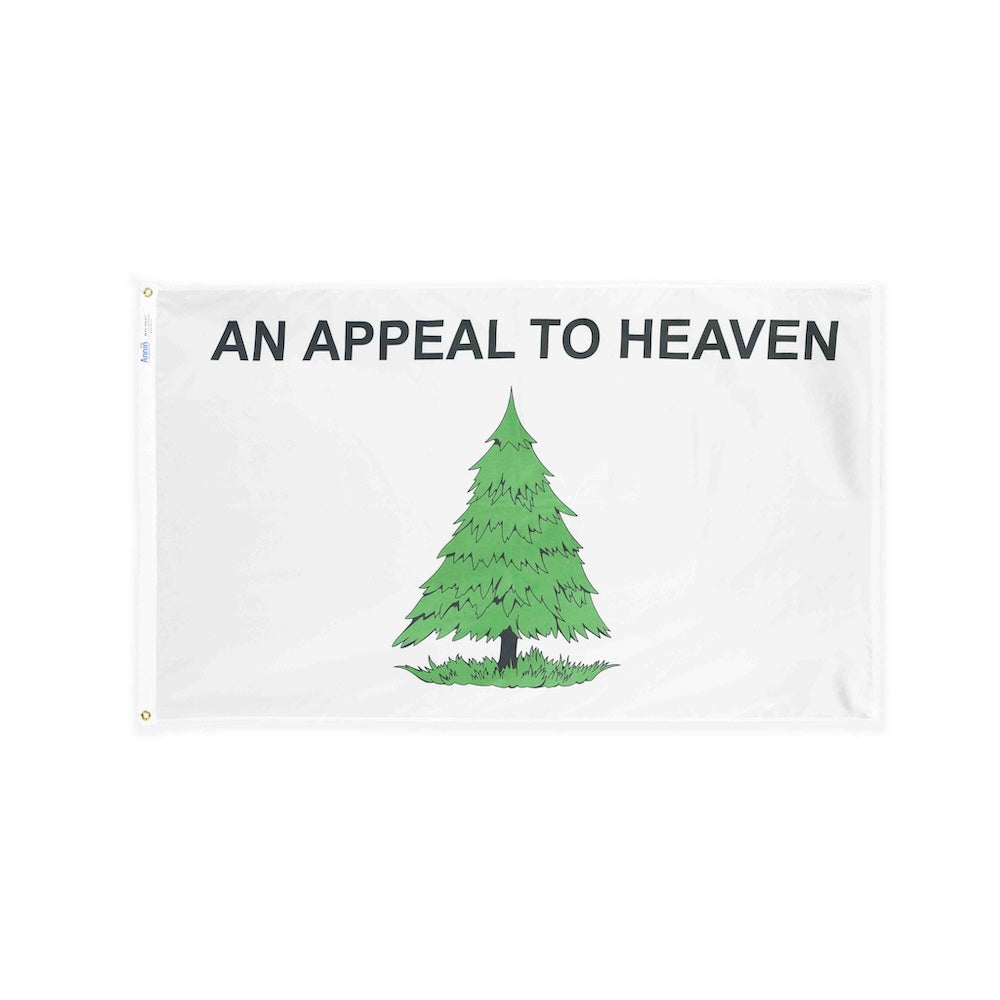Washington's Cruisers (Appeal to Heaven) Flag - 3'x5' - For Outdoor Use
Washington's Cruisers (Appeal to Heaven) Flag - 3'x5' - For Outdoor Use is backordered and will ship as soon as it is back in stock.
Materials & Care
Materials & Care
The webpage provides guidance on properly caring for your flag to ensure its longevity and appearance, including tips on cleaning, storage, and respectful handling. Learn more here.
The 3'x5' nylon Washington's Cruisers Flag, also known as the "Pine Tree Flag" or the "Appeal to Heaven Flag" features a green pine tree on a white field under the motto "An Appeal to Heaven."
- 100% MADE IN THE USA - This means that our flags are manufactured and assembled here in the USA, with materials made in the USA. Made in the USA has been our guiding principle since Flags USA was established in 1987.
- HEADING & GROMMET HOIST EDGE - How a flag is finished on the hoist edge determines how it is best displayed. This flag has a heading and grommet finish and is designed to attach to an outdoor flagpole. It has a sturdy canvas heading and #2 solid brass grommets. The number of grommets is determined by the size of the flag.
- NYLON MATERIAL - We use a tightly woven, high-quality, 200-denier nylon material, giving it a lustrous appearance. The resulting flag is lightweight enough to fly in the slightest breeze, making it ideal for all-weather use.
- SINGLE-REVERSE FLAG CONSTRUCTION - This flag is printed in the single-reverse style. Single-reverse is the most common style of flag construction. With this style, the emblem is visible on both sides of the flag, but the backside of the flag is a mirror image of the front side.
- OUTDOOR USE - This flag is intended for outdoor use.
- ABOUT MULTI-FLAG DISPLAYS - Flags made with different materials "fly" differently. If you are creating a multi-flag display, we recommend choosing the same material for all your flags. If you do, your flag display will have a more uniform look.
The History of the Washington's Cruisers Flag (also known as the "Pine Tree Flag" or "Appeal to Heaven Flag")
The pine tree has long held symbolic meaning in New England, dating back to pre-colonial times. In the late 16th century, the pine tree was dubbed the "tree of peace" by the Iroquois Confederacy. In the 17th century, American colonists adopted the pine tree as a symbol of independence, resistance, and revolution; the pine tree appeared on the flag of New England and currency for the Massachusetts Bay Colony.
Colonists used various interpretations of pine tree flags before George Washington commissioned the version we know today in 1775 for Continental Navy ships — vessels which themselves were made of eastern white pine. In 1776, this flag became the official symbol of the Massachusetts state navy.
The "Washington's Cruisers Flag" earned its title when George Washington ordered the flag flown on navy vessels sent to capture British supply ships as part of the revolutionary fight for American self-determination.
What Is The Meaning and Significance of "Appeal to Heaven"?
The phrase "appeal to heaven" comes from the writings of philosopher John Locke in his Second Treatise on Government:
"And where the body of the people, or any single man, is deprived of their right, or is under the exercise of a power without right, and have no appeal on earth, then they have a liberty to appeal to heaven, whenever they judge the cause of sufficient moment. And therefore, though the people cannot be judge, so as to have, by the constitution of that society, any superior power, to determine and give effective sentence in the case; yet they have, by a law antecedent and paramount to all positive laws of men, reserved that ultimate determination to themselves which belongs to all mankind, where there lies no appeal on earth, viz. to judge, whether they have just cause to make their appeal to heaven."
To "appeal to heaven" reflects the belief that when all legal and peaceful appeals to authority have been exhausted, the only remaining solution is to appeal to a higher power, or heaven, for justice. In the context of the American Revolution, it signified the colonists' belief that their cause for independence was just and sanctioned by divine authority.
In 1775, after the Battles of Concord and Lexington, as colonists prepared for revolution, the President of the Massachusetts Provincial Congress, Joseph Warren, invoked the phrase when stating:
“Nevertheless, to the persecution and tyranny of his cruel ministry we will not tamely submit – appealing to Heaven for the justice of our cause, we determine to die or be free.”
Payment & Security
Your payment information is processed securely. We do not store credit card details nor have access to your credit card information.





